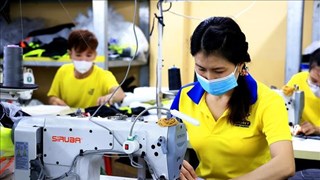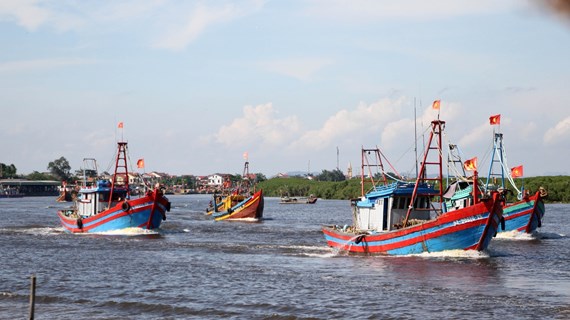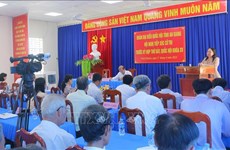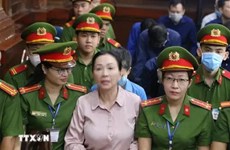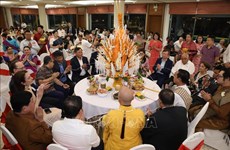Young intellectuals suggest measures to tap industry 4.0 potential
Two hundred young Vietnamese intellectuals have gathered in the central city of Da Nang to pool their ideas to help the country capitalise on opportunities brought about by the 4th industrial revolution (4IR) for a better workforce, environment and business climate.
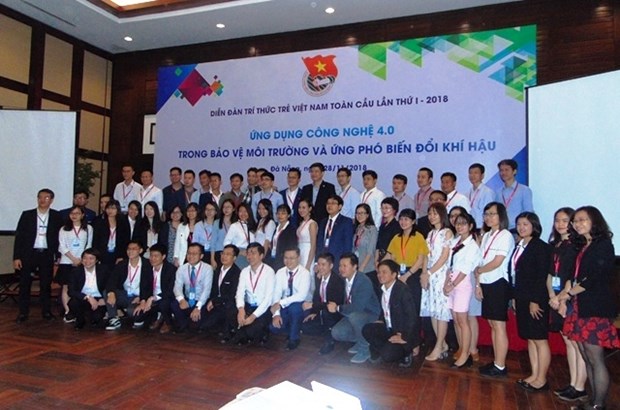 Young Vietnamese intellectuals pose for a group photo at the forum (Photo: doanhnghiephoinhap.vn)
Young Vietnamese intellectuals pose for a group photo at the forum (Photo: doanhnghiephoinhap.vn)Da Nang (VNA) – Two hundred young Vietnamese intellectuals have gathered in the central city of Da Nang to pool their ideas to help the country capitalise on opportunities brought about by the 4th industrial revolution (4IR) for a better workforce, environment and business climate.
The youths, residing in 21 countries and working in 52 different areas, were brought together at the first Global Young Vietnamese Intellectual Forum, themed “Tapping the power of young Vietnamese intellectuals in the 4IR era”.
According to the organiser – the Ho Chi Minh Communist Youth Union Central Committee and the Vietnam Youth Federation – 27 percent of the participants are assistant professors, doctors and post-docs, 25 percent hold Master’s degrees, 33 percent have Bachelor’s degrees and 5 percent are students with outstanding academic performance.
At the last session of the three-day forum on November 29, three groups presented their opinions and recommendations on three main topics – promoting STEM (Science, Technology, Engineering and Mathematics) to build a high-quality workforce; adopting 4IR technologies in environmental protection and climate change response; and promoting innovation in manufacturing and business.
Tran Thi Nhu Hoa from the Gachon University in the Republic of Korea, representing the STEM group, called for a full survey on current STEM education at all levels and the building of a national strategy, policies and an action plan for STEM development.
She proposed the Ministry of Education and Training develop standard STEM programmes, materials, and education models in line with local conditions at all levels of education, with particular attention paid to the groups of the disabled and ethnic minority students. Relevant training courses for teachers and communications campaigns to raise public awareness on STEM education are also needed, she said.
The leader of the group working on the environmental matter, Khuu Thuy Duong from the UK-based University College London, recommended the Government increase the number of relevant cross-sector research projects regarding science, economics, social science, and politics.
According to the group, it is necessary to have more studies on boosting public awareness on disaster risk reduction and the application of 4IR technologies in climate change adaptation, while improving regional energy planning to tap into each region’s advantages.
Nguyen Bich Ngoc from the Vietnam National Economics University, leader of the innovation group, stressed the importance of encouraging the private sector’s involvement in innovation, improving coordination among public agencies and sectors, and leveraging international economic integration for domestic innovation progress.
She said training establishments ought to reform their training methods to enhance their teaching quality and work with businesses to meet practical demand.
The forum rounded off with the establishment of its working mechanism and the debut of a global network of young Vietnamese intellectuals. Participants agreed on the theme of sustainable development for the second forum next year.
At present, there are more than 400,000 Vietnamese intellectuals abroad, including over 6,000 doctorate degree holders. Up to 150,000 are working in the US – of whom, roughly 12,000 working in Silicon Valley, more than 100 at the World Bank, 40,000 in France, 20,000 in Canada, 4,000 in Eastern Europe and Russia, and 7,000 in Australia.–VNA
